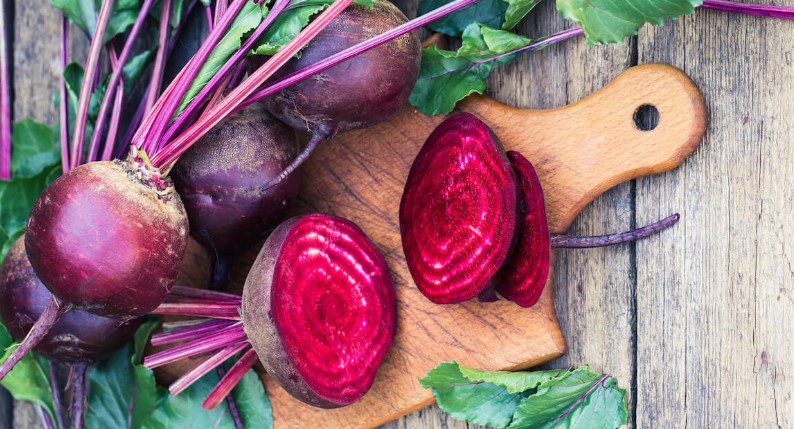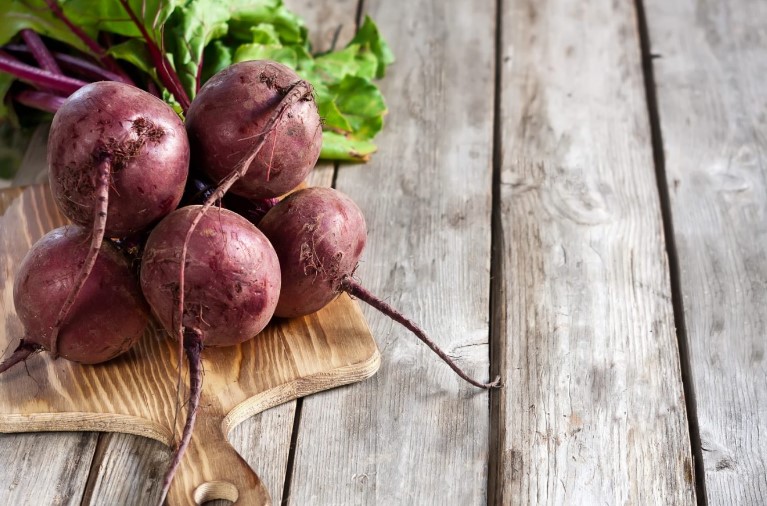Among the various fruits and vegetables that you can include in your daily diet, beetroot is a powerful root vegetable that is rich in nitrates, betalain pigments, fibre and numerous vitamins and minerals. It has a variety of beneficial health properties and is commonly used for blood circulation, menstruation and hepatobiliary disorders. Its dietary nitrates are effective in the treatment of hypertension as they act as a vasodilator.
Beets aren’t just for food coloring. Nope, this humble root vegetable is packed with essential nutrients and provides numerous health benefits if you include it in your diet. We’ve handpicked some of the most compelling science behind beetroots – which also tastes great in salads, smoothies, and as a side dish – that you’ll be completely convinced to make them a staple in your nutritional game plan after reading this article.

Anti-inflammatory
Beetroot contains a diverse range of bioactive compounds, and further research is required to determine whether these compounds are bioavailable in humans. Beetroot is a versatile food source, and its numerous benefits include anti-inflammatory properties. Beetroot juice and other beetroot products can be consumed in a variety of forms, including as a dietary supplement.
Because of its high bioavailability, beetroot is an excellent choice for people seeking to prevent or treat inflammatory diseases.
The richness of nitrates in beetroot juice and its ability to lower blood pressure is also a benefit. These substances relax blood vessels, increasing blood flow and lowering blood pressure.
Another benefit of beetroot is its iron and folic acid content, which can boost the production of red blood cells and increase hemoglobin levels. As a result, beetroot has anti-inflammatory benefits, and helps maintain a healthy digestive system.
Anti-cancer
In addition to its nutritional value, beetroot is rich in phytochemicals that can prevent cancer from spreading. The scientific name for the beet is Beta vulgaris. The plant is grown for both its taproot and leaves, and is often used as a vegetable or in beverages. Some people use beetroot to treat heart problems, urinary tract infections, and sexual dysfunction. Aside from its anti- cancer benefits, beetroot is also commonly used for a wide range of ailments, including cardiovascular diseases, sexual weakness, and bladder stones. The nutrient content of this vegetable has been proven in numerous studies.
Betanin, one of the main components of beetroot, has shown anti-proliferative effects on human bladder cancer cells. Betanin, along with vitexin-2-O-xyloside, inhibits the proliferation of human bladder cancer cells. Both substances have been shown to enhance proapoptotic BAX protein levels and inhibit the expression of prosurvival components such as CTNNB1. Interestingly, beetroot has also been used to supplement conventional treatments for cancer, such as chemotherapy and radiation.

Anti-ageing
Adding beetroots to your diet has numerous benefits. These antioxidants can reduce fine lines, wrinkles and pigmentation. Beets contain high levels of squalene and lycopene, which help your skin stay young and radiant. You can juice or apply beetroot paste to your face twice a week for anti-ageing benefits. They can even decrease your body weight.
Besides providing anti-ageing benefits, beets are also rich in vitamins and minerals. The high content of vitamin C and folate in beets may explain the antioxidant activity of these vegetables. Vitamin C benefits the cells in the skin. Beets can also reduce the signs of hyperpigmentation and acne. Vitamin C helps fight wrinkles, blemishes, and other signs of aging.
Beetroot has a lot of perks, making it easy to see why so many people are eager to add it to their diets. Few things are more difficult than finding ways to add nutrients and flavor to regular meals. Luckily, the benefits of beetroot make this a lot simpler. It’s not hard to find beets at the grocery store either; you can incorporate them in salads, soups, and even desserts. If you aren’t fond of these ways to eat beets, you can also try juicing them for a boost of vitamins and minerals that can easily be added to your daily routine.

